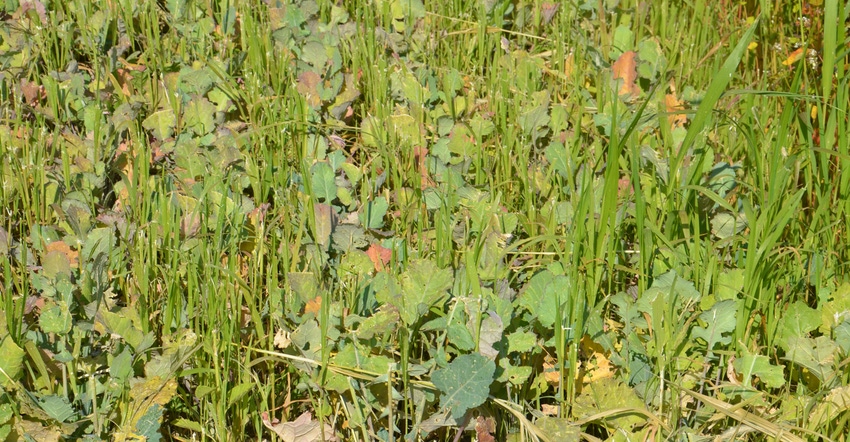May 7, 2019

By Don Donovan
Are you concerned about using fungicides in your farming operation? Some farmers focusing on soil health are taking steps to avoid using them whenever possible.
For example, Rick Clark, Williamsport, Ind., uses untreated soybean and corn seed in his operation. He doesn’t want to run the risk of damaging soil microbes that impart health to his soil. He works far in advance with his seedsman and special-orders his seed corn so he can get it without treatments.
Are there other ways to control soilborne fungal diseases besides using fungicides, particularly seed treatment fungicides? Other farmers in west-central Indiana are trying a different approach than the standard fungicide treatment. Some farmers are using brassicas in their cover crop mixes. They report finding reduced need for fungicides in some cases. Brassicas, such as the various mustards and rapeseed, can provide suppression of soil fungal disease problems.
Natural fumigant
Brassicas are of interest because they produce glucosinolates. These can be converted into chemicals in the soil that can provide biofumigant activity. These secondary chemicals behave like the active ingredient in commercial fumigants.
To see if planting brassicas would help on your farm, consider setting up strip trials in a field that has soil fungal disease concerns. As with all field-level trials, leave a control strip in addition to any treatment strip you wish to try.
You can compare various fungicide products, in addition to various brassica cover crops and mixes. The width of the strips should be at least twice the width of the combine header you will use to harvest the crop. With the assistance of your local crop adviser, monitor the strips throughout the growing season, noting any differences in disease incidence, crop health and yield.
Every farmer will greatly benefit by trying some type of on-farm strip trial with the goal of improving profit margin though decreased input and increased yields. This is just another example of a practice worth trying on your own farm. If you have soilborne disease issues, conducting a strip trial may provide the information you need to deal with the situation.
Make a plan
As with all cover crops, be sure you have a plan. It should include selection of species, seeding dates and methods, and termination. Have alternate plans in mind in case the weather doesn’t cooperate. When using brassicas, be sure you know the seed source. You don’t want to have glyphosate-resistant canola in the mix. Also, be sure not to let the brassica plants go to seed!
The use of cover crops provides many benefits, and helping control soil fungal issues could be one of those benefits on your farm. Use on-farm research trials to make your farming operation more efficient, reduce inputs, improve yields and especially improve profit margin.
It should be noted that at this time, there is more anecdotal evidence that certain cover crops might help control specific soilborne fungi than there is scientific proof. That’s why trials on your own farm are so important. Set them up so they are replicated if possible, so results are as meaningful as possible.
Donovan is a district conservationist with the Natural Resources Conservation Service. He writes from Rockville, Ind. Tom J. Bechman contributed to this story.
You May Also Like




